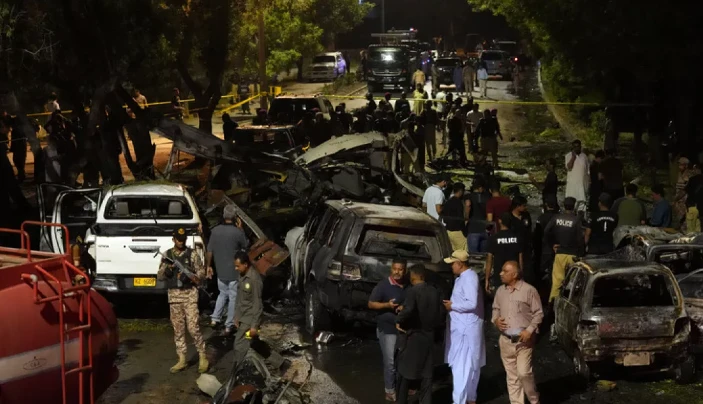Karachi blast: Attempt to undermine Pakistan-China ties

Stay tuned with 24 News HD Android App

On Sunday night, a suicide attack targeted the convoy of Chinese engineers from Port Qasim Power Generation Company Limited at Jinnah International Airport in Karachi. The engineers had arrived from Bangkok. The attack resulted in 3 fatalities, including 2 Chinese engineers, Li Jun and He Chun Zin, and a foreign national, Li Zhao O, with 17 others injured. The suicide bomber, Shah Fahad Nushki, a Balochistan resident, used a Toyota Rav4 (KW-0375) loaded with 70-80 kg of explosives. He rammed into the convoy on Shaara Faisal Road, causing a massive explosion that damaged 12 vehicles, destroyed 3 vehicles and 4 motorcycles, and set nearby vehicles ablaze.
Preliminary investigations reveal that Shah Fahad, linked to 3-4 previous attacks, facilitated by a nearby building, carried out the bombing. The Balochistan Liberation Army (BLA) has claimed responsibility. The convoy had over 25 engineers, and police and security personnel were among those injured. Following the devastating suicide attack on the Chinese convoy in Karachi, DSP Fawad Shaheen from the Special Branch China Desk has been removed due to security lapses. The investigation has been expanded to include analysis of attacker Shah Fahad's identity documents, obtained through NADRA records and SIMS data.
In response to the attack, the Chinese Embassy and Consulates in Pakistan have implemented an emergency response plan, condemning the terrorist act and demanding a thorough investigation and justice. China has urged Pakistan to ensure strict security measures for CPEC, Chinese citizens, and joint projects - a duty Pakistan's government and security agencies take seriously.
Pakistan's Prime Minister, Mian Muhammad Shahbaz Sharif, and Federal Interior Minister Mohsin Naqvi, visited the Chinese Embassy to condone the Ambassador Jiang Zaidong. Shahbaz Sharif assured that the safety of Chinese nationals in Pakistan is a top priority, vowing not to tolerate any attempts to harm Pakistan-China relations. Ambassador Jiang Zaidong thanked Shahbaz Sharif for initiating the investigation, protecting Chinese citizens, and enhancing security for ongoing projects.
Federal Interior Minister Mohsin Naqvi briefed the Chinese Ambassador on the blast's details, investigation progress, and key developments. He emphasized that the attack targeted not just Chinese citizens, but Pakistan itself, and undermining Pakistan-China friendship is unacceptable. Protecting Chinese nationals is the top priority; cowardly conspiracies will not succeed. A thorough investigation into the Karachi attack will ensure those responsible face justice.
The Chinese Ministry of Foreign Affairs spokesperson expressed deep concern to Pakistan's government regarding the attack on Chinese engineers and citizens. China will continue to collaborate with Pakistan to thwart attempts to sabotage their fraternal relations. Pakistan's leadership, including President Asif Ali Zardari, Maulana Fazlur Rehman, and Bilawal Bhutto Zardari, condemned the attack, terming it an assault on Pakistan-China friendship. They recognize the motive behind the attack: to obstruct CPEC projects in Gwadar and hinder Pakistan's economic growth through foreign investment.
The government of Pakistan bears the responsibility of ensuring the safety and security of Chinese citizens in the country. Recent years have witnessed numerous attacks on Chinese experts and workers, underscoring the need for foolproof security measures to prevent such incidents. Terrorist organizations seem to be shifting their focus towards targeting foreign officials and citizens, as evidenced by the attacks on the Chinese Consulate in Karachi in November 2018, the University of Karachi Confucius Institute in April 2022, and the convoy of Chinese engineers in the Basham area en route to Dasu Dam in March.
The presence of a large number of Chinese citizens in Pakistan for CPEC projects has made them a prime target for terrorists. The ultimate goal of these attacks is to create an atmosphere of fear and insecurity, deterring foreign investment and hindering Pakistan's economic progress. To counter this, Pakistan must enhance its intelligence system and security situation to eradicate terrorism and protect its citizens and foreign partners. By improving the security situation and intelligence system, Pakistan can foil the conspiracy of terrorist organizations and their facilitators, ultimately eradicating the fabric of terrorism.
Terrorists have repeatedly targeted Chinese citizens working on various CPEC projects in Pakistan, a crucial program driving the country's development and prosperity. The recent Karachi attack's timing suggests sinister intentions, coinciding with the upcoming Shanghai Cooperation Organization meeting in Islamabad on October 15 and 16. Security is on high alert, especially with the Chinese Prime Minister's scheduled visit, the first in 11 years.
The upcoming meeting with the Chinese Prime Minister is expected to cover key issues, including the payment plan for Pakistan's $16 billion Chinese loans. This discussion is crucial, as Pakistan has been seeking debt restructuring amid rising CPEC project payments. Additionally, various investment projects will be signed under the Special Investment Facilitation Council (SIFC), a facility established to fast-track project development and facilitate investors. The government of Pakistan aims to capitalize on this opportunity, provided the country's political conditions remain stable. Successful negotiations could lead to attractive deals for 25 projects valued at approximately $25 billion, potentially enabling Pakistan to repay its $16 billion Chinese debt.
To safeguard Pakistan's economic progress and international partnerships, it is imperative that the government, security forces, and institutions collaborate to ensure the security of foreign nationals. A comprehensive strategy must be implemented to enhance law and order and overall security, preventing malicious elements from undermining the country's stability. By doing so, Pakistan can prevent future attacks and create a conducive environment for economic development and prosperity.
